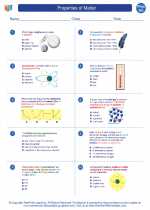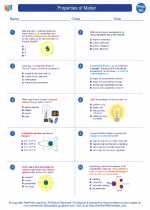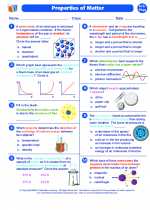Introduction to Chemistry
Chemistry is the branch of science that deals with the properties, composition, and structure of substances, as well as the changes they undergo during chemical reactions. It is often called the central science because it connects and overlaps with other branches of science such as biology, physics, and environmental science.
Key Concepts in Chemistry
- Atoms and Elements: Atoms are the basic units of matter, and elements are the pure substances made up of a single type of atom. The periodic table is a key tool for understanding the properties of elements.
- Chemical Reactions: Chemical reactions involve the rearrangement of atoms to form new substances. This is often represented using chemical equations.
- Chemical Bonds: Chemical bonds are the forces that hold atoms together in compounds. Covalent, ionic, and metallic bonds are the main types.
- States of Matter: Matter can exist in different states - solid, liquid, and gas - based on the arrangement and movement of its particles.
- Acids and Bases: Acids and bases are important classes of compounds that have distinct properties and behaviors.
- Stoichiometry: Stoichiometry is the study of the quantitative relationships in chemical reactions and is crucial for understanding the amounts of substances involved.
- Thermodynamics: Thermodynamics deals with the energy changes that occur during chemical reactions and the relationships between energy and matter.
Study Guide for Chemistry
When studying chemistry, it's important to understand the fundamental concepts and principles. Here are some tips for effective studying:
1. Understand the Structure of Atoms
Learn about the structure of atoms, including the arrangement of subatomic particles (protons, neutrons, and electrons) and how they contribute to the properties of elements.
2. Master the Periodic Table
Memorize the key information about elements on the periodic table, such as atomic number, atomic mass, and chemical symbols. Understand the periodic trends in properties such as atomic radius, electronegativity, and ionization energy.
3. Practice Writing and Balancing Chemical Equations
Work on writing and balancing chemical equations to represent chemical reactions. Understand the concepts of reactants, products, and conservation of mass in chemical reactions.
4. Learn about Chemical Bonding
Understand the different types of chemical bonds (covalent, ionic, and metallic) and the factors that influence bond formation and strength.
5. Explore States of Matter
Study the properties of solids, liquids, and gases, including the behaviors of particles in each state and the transitions between states.
6. Understand Acids and Bases
Learn about the properties of acids and bases, including pH, indicators, and the behavior of acids and bases in aqueous solutions.
7. Practice Stoichiometry Problems
Work on solving stoichiometry problems to understand the relationships between amounts of reactants and products in chemical reactions.
8. Study Thermodynamics Concepts
Understand the laws of thermodynamics, heat transfer, enthalpy, entropy, and how they relate to chemical reactions and energy changes.
By focusing on these key concepts and practicing problem-solving, you can build a strong foundation in chemistry and prepare for success in your studies.
[Chemistry] Related Worksheets and Study Guides:
.◂Physics Worksheets and Study Guides High School. Properties of Matter

 Worksheet/Answer key
Worksheet/Answer key
 Worksheet/Answer key
Worksheet/Answer key
 Worksheet/Answer key
Worksheet/Answer key
